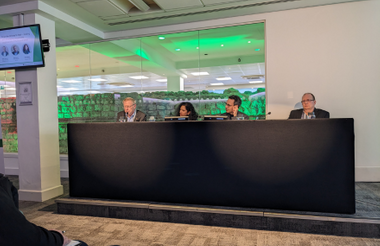Chief executives of major UK charities have shared their thoughts on how the ongoing cost-of-living crisis could affect organisations deciding to merge or close down.
At Civil Society’s ESG Imperative event yesterday, Paul Farmer, Enver Solomon and Farah Nazeer, the respective CEOs of Age UK, the Refugee Council and Women’s Aid, discussed how to lead a charity responsibly in an era of permacrises.
Asked whether charities could be forced toward mergers or something similar in the coming years, Farmer said some of Age UK’s network of over 120 local organisations were facing “real pressure”.
“We have to acknowledge the extraordinary contribution the British public made to the charity sector during Covid-19. In effect, that led to organisations feeling that they were okay, they didn’t need to merge because as a whole the sector did better than most people were fearing.
“I’m a bit worried about where we are at the moment, in particular for local organisations. I think we may well see a little bit more mergers and sadly more closures than we’ve seen previously.”
‘More willingness’ to collaborate
Nazeer from Women’s Aid, a federation of over 170 domestic abuse services across England, said that the recent spate of local authorities issuing section 114 notices “has meant that lots of services that we run on the ground had to halve their services within a month, eight weeks or sometimes close down”.
“It’s been pretty dire on the ground […] This isn’t a happy tale, you shouldn’t have to be in this position. But what has come from that is more willingness to do things like shared back office.
“When I joined, the membership wasn’t interested at all in doing that. Even though they’re geographically sensible arrangements you wouldn’t have organisations that might be competing for the same set of donors or funders sharing fundraising or HR support.
“But I think the pressures have helped make organisations rapidly reconsider and we’re certainly exploring it as well as an organisation. We will see more of that and that’s absolutely right.”
Solomon from the Refugee Council said that despite some charities combining sevices, there was “an instinctive lack of desire to merge in our sector”.
“What is behind it is we all see ourselves as uniquely important, unique and valuable,” he said.
“I always find myself looking back and then looking forward. When Covid-19 happened, everyone was saying: ‘Everyone is going to merge.’ There have been some, but there haven’t been mass mergers.
“And when austerity kicked in a decade ago, [everyone was saying]: ‘All those charities are going to merge.’ It hasn’t happened. I think it will be pretty much the same place.”
Too many charities?
The panellists were also asked whether there were too many charities doing the same work.
Solomon said that although he sees the logic of some organisations combining, it does not necessarily make sense for those who run small charities.
“At the local level, particularly in my sector, some of the smallest organisations are run by volunteers. Their overheads are absolutely miniscule and merging is just not on their radar and never will be.
“If they were to end, those people might go and create something else in the future or go and volunteer with another organisation. They wouldn’t necessarily see mergers as a viable option and I think it’s important to hold on to that.”
Farmer cited the private sector, where “there are probably thousands of new companies being formed every single day, some of whom are going to be the biggest companies in the world in 20 or 30 years’ time”.
“I don’t think we want to stifle that degree of innovation but at the same time, we do need to look and make sure that we’re not just there simply because we’ve always been there,” he said.
“The way in which we think about our current role and purpose is going to be key going forward.
“If we can find ways to collaborate more effectively, not just within our individual sector silos but also across the whole sector, which is really hard, then we might find there are other ways of doing things.”
He added that one lesson from Age UK’s formation, from the merger of Age Concern and Help the Aged in 2009, is that it took a “huge” amount of time, effort and energy to make it happen.
“If you don’t have the headspace to do that or have a limited amount of bandwidth to think about something, is that necessarily going to be the first thing you’re going to think about at this particular moment? I’m not sure it will be.”
‘Charities need to look at whether or not they still need to exist’
Nazeer pointed out that the women’s services sector has “the opposite problem”.
“We don’t have enough provision and that provision is already closing,” she said.
“With a 70% first refusal rate into refuge, I don’t think there’s much duplication and overlap when it comes to provision.
“Often in one area, particularly when we’re talking about local charities, there’s one charity or two that are providing for a vast number of people.
“But there are other sectors and specific parts where we can see, particularly at the national level, more clear duplication.”
She added that as a federated charity, it would be “very difficult” for Women’s Aid to merge unless it was done with another membership body.
“It would be very difficult, for example, to merge with an organisation that provided services because that would immediately create competition with the membership base. We have looked at that but there isn’t another membership body.
“I think all charities do need to look at it and examine whether or not they still need to exist. And certainly, if they need to exist in the form that they’re currently existing.”
Related articles










